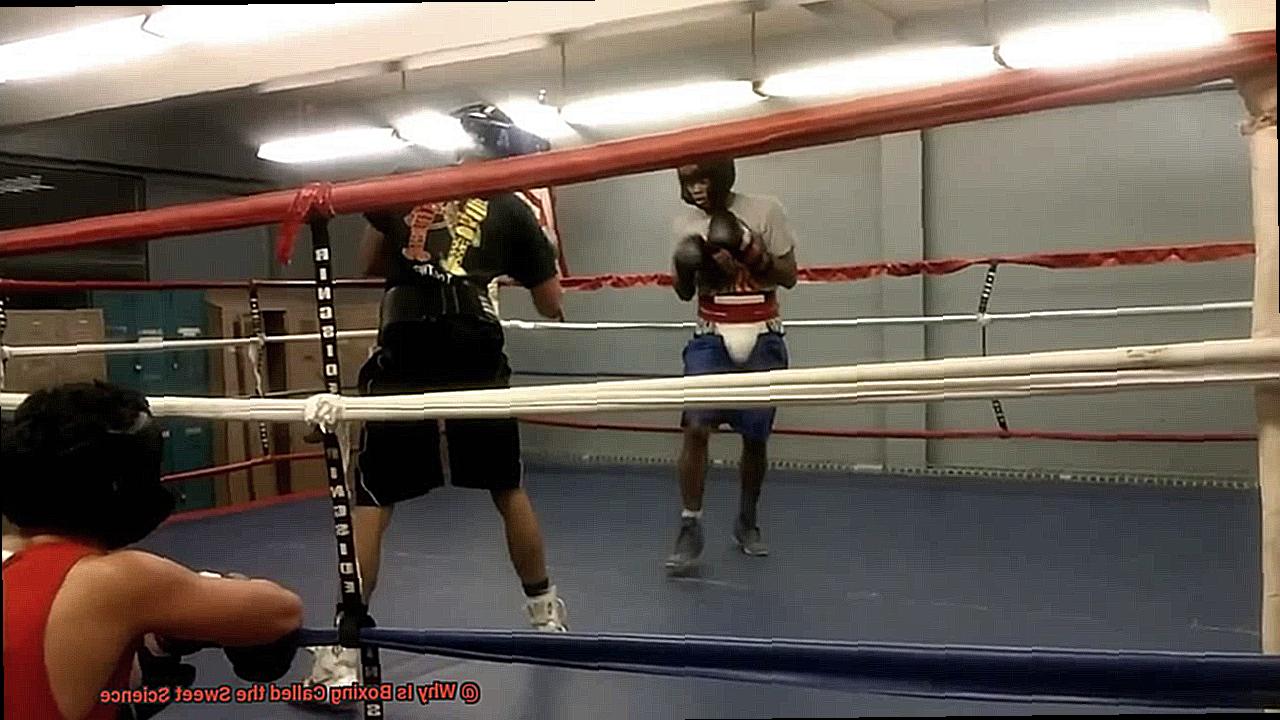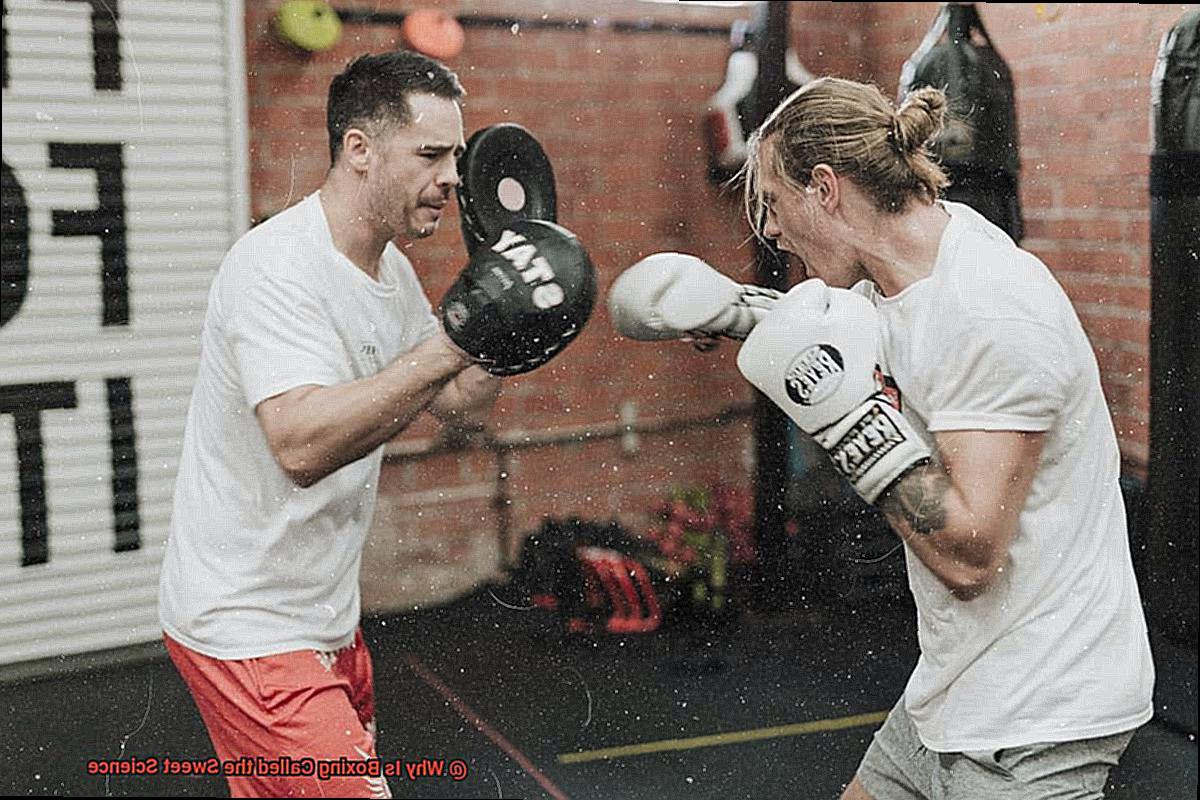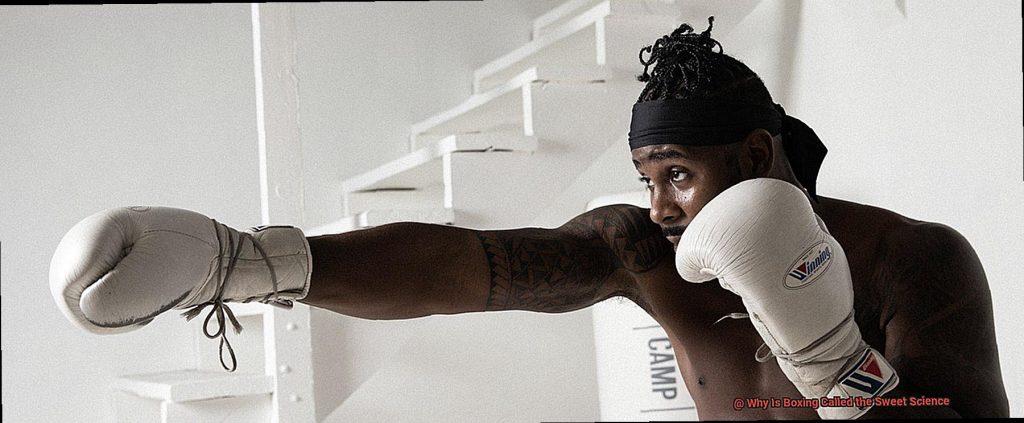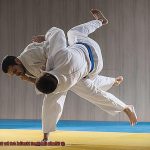Boxing is more than just a brutal sport – it’s an art form. And one of the things that makes boxing so unique is its nickname: the sweet science. But why exactly is this sport called such a sweet name?
Boxing is a game of strategy, tactics, and skill. It requires lightning-fast reflexes, precise footwork, and the ability to exploit an opponent’s weaknesses while avoiding their strengths. To be a successful boxer, you need to possess natural talent, dedication, and an unwavering commitment to training.
But there’s more to boxing than just physical prowess alone. The sweet science also refers to the intricate science of movement and understanding the forces that govern it. Boxers must learn how to time their punches perfectly, coordinate their movements with pinpoint accuracy, and deliver blows with maximum force while minimizing wasted energy.
In essence, boxing is a complex dance between two fighters that requires intelligence, talent, and skill. It’s not just about throwing punches – it’s about mastering the art of timing and spacing. And when you witness two skilled boxers in action, it can be a truly breathtaking sight.
From the intense buildup before a fight to the crisp sound of leather gloves striking each other in the ring, boxing has a way of captivating audiences like no other sport can. It truly is the sweet science – an elegant yet brutal art form that demands respect from anyone who dares step into the ring.
History of the Term “Sweet Science”
Boxing has long been referred to as the “sweet science,” a term that captures the beauty and complexity of this sport. While the origins of this phrase are not entirely clear, it has been used for over a century to describe boxing’s combination of physical toughness and mental strategy.
Some sources attribute the term to A.J. Liebling, a renowned boxing journalist and historian who used it in his writing in the 1950s. However, Liebling himself claimed that he had heard the term from an old-time boxing fan who appreciated the sport’s subtleties and nuances.
Others trace the term’s origins back even further, to John Graham Chambers, an English writer and publisher who wrote extensively about boxing in the late 1800s. Chambers was known for his appreciation of the sport’s technical aspects, and he may have used the phrase to describe the artistry involved in a well-executed punch or defensive maneuver.
Regardless of its origins, the term “sweet science” perfectly captures what makes boxing such a fascinating and engaging sport. At its core, boxing requires both physical and mental skills. Boxers must master various techniques, such as footwork, punching, and defense, to outmaneuver their opponents. These skills demand years of training and practice to perfect, making boxing a complex and sophisticated sport.
However, boxing is not just about physical skill; it also demands mental agility and quick thinking. Boxers must constantly assess their opponents’ strengths and weaknesses and adjust their tactics accordingly. This requires discipline, focus, and an ability to remain calm under pressure.
The term “sweet science” suggests that there is more to boxing than just brute force and aggression. It honors the history and tradition of this sport while also acknowledging its evolution into a sophisticated and highly technical pursuit.
Technical Aspects of Boxing
Boxing is often referred to as the “sweet science” because it is a sport that demands a high level of technical skill and precision. It’s not just about throwing punches, but rather the intricate footwork, timing, and strategy involved in each fight.
Footwork is crucial in boxing. Boxers need to be light on their feet, with quick and precise movements that allow them to evade their opponent’s punches while setting up their own attacks. This requires a great deal of balance, coordination, and agility. A good boxer will use a range of footwork techniques like pivots, shuffles, and side-steps to stay ahead of their opponent.
Hand positioning is another key aspect of boxing. Boxers need to keep their hands up at all times to protect their face and body from incoming punches. This requires a lot of strength and endurance in the arms and shoulders, as well as quick reflexes to block or dodge punches that get through. Boxers also need to be able to throw punches with accuracy and power, using a variety of techniques like jabs, crosses, hooks, and uppercuts.
Timing is also critical in boxing. Boxers need to read their opponent’s movements and anticipate their next move, allowing them to counter-attack effectively. This requires a lot of focus and concentration, as well as an understanding of the rhythms and patterns of the sport.
Strategic Nature of Boxing

Boxing has often been referred to as the sweet science, and for a good reason. It is a sport that demands more than just brute strength and aggression. It requires a strategic mind, patience, and mental agility. Boxing is not just about throwing punches but about anticipating your opponent’s next move.
Footwork is one of the most critical aspects of boxing strategy. A boxer must be quick and efficient in their movements around the ring while maintaining balance and stability. Footwork allows a boxer to control the pace of the fight, avoid punches, and set up their own attacks.
Defense is another crucial element of boxing strategy. Boxers must be able to anticipate incoming punches and counterattack while also evading or blocking them. This requires quick reflexes and impeccable timing.
The mental aspect of boxing strategy is equally important. Boxers must be able to read their opponents’ movements and anticipate their next moves. They need to think several steps ahead and be ready to change tactics at a moment’s notice.
Knowing when to attack and when to wait for an opening is another essential part of boxing strategy. Boxers need to be patient and look for weaknesses in their opponents’ defenses. They also need to conserve their energy and avoid getting worn down too quickly.

Boxing requires a perfect balance of physical skill, mental strategy, and patience, making it truly unique. It’s not just about who can throw the hardest punches; it’s about who can outsmart their opponent with strategic moves. The sweet science of boxing demands precision, grace, and technical skill, which sets it apart from other combat sports.
Mental and Physical Skills Required to Excel in Boxing
Boxing is not just about throwing punches. It’s a sport that demands both mental and physical strength. To become a successful boxer, you need to have a unique set of skills, including physical fitness, mental toughness, discipline, determination, and perseverance.
Physical fitness is the foundation of boxing. Boxers need to have excellent cardio endurance, strength, agility, quick reflexes, and hand-eye coordination. They train rigorously with running routines, strength training, and sparring sessions to enhance their physical abilities. A boxer’s body needs to be in top shape to withstand the physical demands of the sport.
However, physical fitness alone isn’t enough to make a great boxer. Mental toughness is also critical. Boxing matches can be physically and mentally exhausting, and boxers need to be mentally resilient. They must stay focused and composed even under extreme pressure. In addition, boxers must possess strategic thinking skills that enable them to analyze their opponents’ movements and come up with effective counter-attacks.
Discipline is another essential mental skill that boxers must master. To stay in top condition, boxers must adhere to strict training schedules and maintain a healthy lifestyle. This includes following a balanced diet, getting enough rest, and avoiding substance abuse. A boxer’s discipline off the ring is just as important as their performance inside the ring.
Finally, perseverance and determination are crucial mental skills that boxers must have. Boxing is a brutal sport that requires years of hard work and dedication to achieve success. Boxers must be willing to push themselves beyond their limits to achieve their goals.
Discipline and Focus Needed for Boxing
Boxing isn’t just about throwing punches – it’s a sport that requires a unique combination of physical, mental, and emotional discipline. As an expert in the field, I can attest that boxing demands a level of focus and dedication that sets it apart from other sports. Let’s explore what it takes to succeed in this challenging sport.
Physical Discipline
Boxers must be in peak physical condition to perform at their best. This means adhering to a strict diet and rigorous exercise routine. Boxers must have exceptional cardio endurance, strength, agility, quick reflexes, and hand-eye coordination. They must also maintain their physical conditioning throughout a fight, which can last multiple rounds.
Mental Discipline
Boxing requires mental toughness and focus beyond what is expected in most sports. Boxers must be able to push themselves beyond their physical limits and maintain focus during competition. They need to be able to read their opponents quickly and adjust their strategy accordingly. This requires mental agility, quick thinking, and the ability to stay calm under pressure.
Emotional Discipline
Boxers must be able to control their emotions both inside and outside of the ring. Emotional discipline is critical as it can impact decision-making and ultimately the outcome of the fight. Boxers who can remain calm under pressure and avoid getting emotionally charged during a fight are more likely to come out on top.
9wl3TW33Bck” >
Conclusion
To sum up, boxing is not just about brawn and aggression. It requires a unique blend of physical and mental skills such as strategic thinking, discipline, determination, and perseverance. The term “sweet science” has been used for over a century to describe the beauty of movement and complexity of strategy involved in this sport.
Boxing demands precision and grace in every aspect from footwork to hand positioning to timing. Boxers must master various techniques like footwork, punching, and defense to outmaneuver their opponents while possessing strategic thinking skills that enable them to analyze their opponents’ movements and come up with effective counter-attacks.
Moreover, discipline is another essential skill that boxers must master. To stay in top condition, boxers must adhere to strict training schedules and maintain a healthy lifestyle by following a balanced diet, getting enough rest, and avoiding substance abuse.
In conclusion, boxing is an elegant yet brutal art form that demands respect from anyone who dares step into the ring. The sweet science of boxing requires both physical prowess and mental agility which sets it apart from other combat sports.






